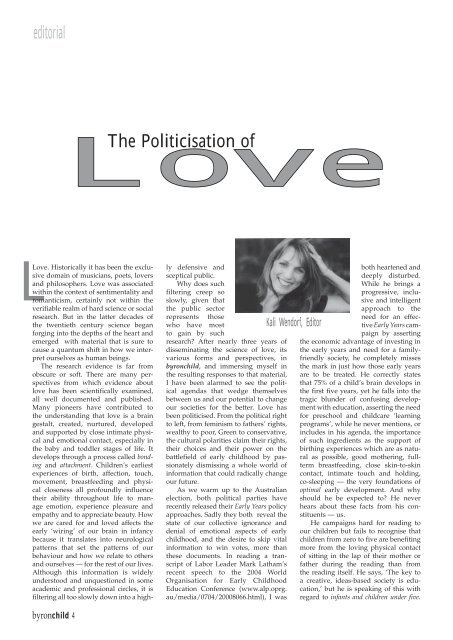byronchild - logo
byronchild - logo
byronchild - logo
Create successful ePaper yourself
Turn your PDF publications into a flip-book with our unique Google optimized e-Paper software.
editorial<br />
Love. Historically it has been the exclusive<br />
domain of musicians, poets, lovers<br />
and philosophers. Love was associated<br />
within the context of sentimentality and<br />
romanticism, certainly not within the<br />
verifiable realm of hard science or social<br />
research. But in the latter decades of<br />
the twentieth century science began<br />
forging into the depths of the heart and<br />
emerged with material that is sure to<br />
cause a quantum shift in how we interpret<br />
ourselves as human beings.<br />
The research evidence is far from<br />
obscure or soft. There are many perspectives<br />
from which evidence about<br />
love has been scientifically examined,<br />
all well documented and published.<br />
Many pioneers have contributed to<br />
the understanding that love is a brain<br />
gestalt, created, nurtured, developed<br />
and supported by close intimate physical<br />
and emotional contact, especially in<br />
the baby and toddler stages of life. It<br />
develops through a process called bonding<br />
and attachment. Children’s earliest<br />
experiences of birth, affection, touch,<br />
movement, breastfeeding and physical<br />
closeness all profoundly influence<br />
their ability throughout life to manage<br />
emotion, experience pleasure and<br />
empathy and to appreciate beauty. How<br />
we are cared for and loved affects the<br />
early ‘wiring’ of our brain in infancy<br />
because it translates into neurological<br />
patterns that set the patterns of our<br />
behaviour and how we relate to others<br />
and ourselves — for the rest of our lives.<br />
Although this information is widely<br />
understood and unquestioned in some<br />
academic and professional circles, it is<br />
filtering all too slowly down into a high-<br />
<strong>byronchild</strong> 4<br />
Love<br />
The Politicisation of<br />
ly defensive and<br />
sceptical public.<br />
Why does such<br />
filtering creep so<br />
slowly, given that<br />
the public sector<br />
represents those<br />
who have most<br />
to gain by such<br />
research? After nearly three years of<br />
disseminating the science of love, its<br />
various forms and perspectives, in<br />
<strong>byronchild</strong>, and immersing myself in<br />
the resulting responses to that material,<br />
I have been alarmed to see the political<br />
agendas that wedge themselves<br />
between us and our potential to change<br />
our societies for the better. Love has<br />
been politicised. From the political right<br />
to left, from feminism to fathers’ rights,<br />
wealthy to poor, Green to conservative,<br />
the cultural polarities claim their rights,<br />
their choices and their power on the<br />
battlefield of early childhood by passionately<br />
dismissing a whole world of<br />
information that could radically change<br />
our future.<br />
As we warm up to the Australian<br />
election, both political parties have<br />
recently released their Early Years policy<br />
approaches. Sadly they both reveal the<br />
state of our collective ignorance and<br />
denial of emotional aspects of early<br />
childhood, and the desire to skip vital<br />
information to win votes, more than<br />
these documents. In reading a transcript<br />
of Labor Leader Mark Latham’s<br />
recent speech to the 2004 World<br />
Organisation for Early Childhood<br />
Education Conference (www.alp.oprg.<br />
au/media/0704/20008066.html), I was<br />
Kali Wendorf, Editor<br />
both heartened and<br />
deeply disturbed.<br />
While he brings a<br />
progressive, inclusive<br />
and intelligent<br />
approach to the<br />
need for an effective<br />
Early Years campaign<br />
by asserting<br />
the economic advantage of investing in<br />
the early years and need for a familyfriendly<br />
society, he completely misses<br />
the mark in just how those early years<br />
are to be treated. He correctly states<br />
that 75% of a child’s brain develops in<br />
the first five years, yet he falls into the<br />
tragic blunder of confusing development<br />
with education, asserting the need<br />
for preschool and childcare ‘learning<br />
programs’, while he never mentions, or<br />
includes in his agenda, the importance<br />
of such ingredients as the support of<br />
birthing experiences which are as natural<br />
as possible, good mothering, fullterm<br />
breastfeeding, close skin-to-skin<br />
contact, intimate touch and holding,<br />
co-sleeping — the very foundations of<br />
optimal early development. And why<br />
should he be expected to? He never<br />
hears about these facts from his constituents<br />
— us.<br />
He campaigns hard for reading to<br />
our children but fails to recognise that<br />
children from zero to five are benefiting<br />
more from the loving physical contact<br />
of sitting in the lap of their mother or<br />
father during the reading than from<br />
the reading itself. He says, ‘The key to<br />
a creative, ideas-based society is education,’<br />
but he is speaking of this with<br />
regard to infants and children under five.


